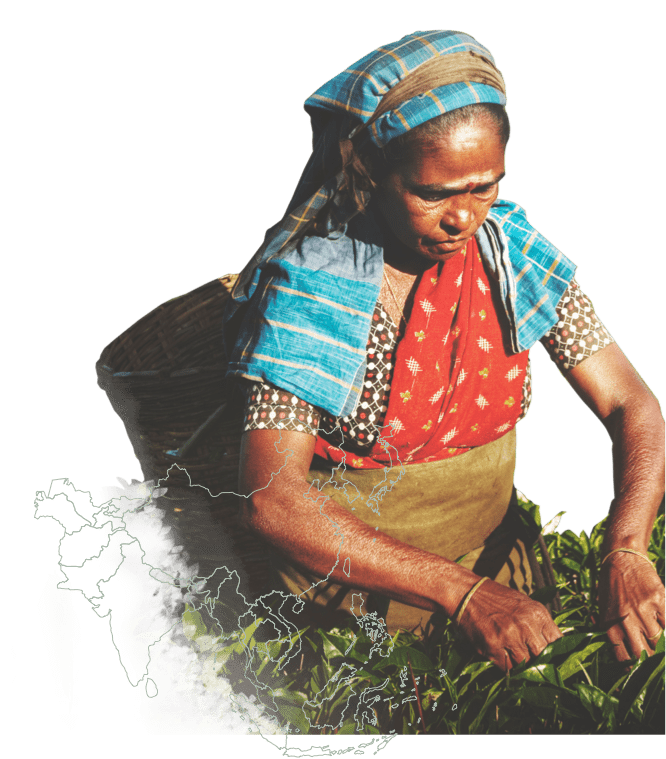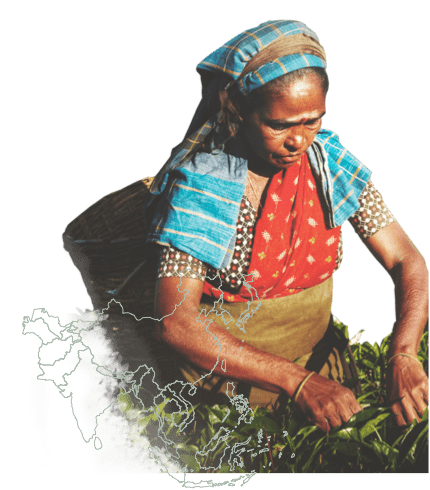Tea expertise from plant to cup
Premium tea is the culmination of all sorts of elements, from sunshine and soil, to picking, rolling, blending and much more. The journey from plant to cup all affects the final product your customers enjoy.

Travel around our tea origins
Origin of our premium tea
Tea grows in many regions of the world. However, there are special tea gardens in certain ‘single origin’ places which provide the ideal climate and conditions to grow high quality teas.
Naturally, Julius Meinl sources its teas from the world’s most famous tea gardens to be able to bring you superb high-rated tea.
Idalgashinna
Famous for being one of the pioneers in organic tea cultivation, the Idalgashinna tea garden is in the UVA region of Sri Lanka, approximately 1.200 above sea level.
Origin of our premium tea
Happy Valley
Founded in 1854, Happy Valley is the second oldest tea estate in Darjeeling, India. It lies at the foot of the Himalaya Mountains. This garden is known for its fine, hand-cropped teas – especially for the second flush Darjeelings plucked in the peak season from June to July.
Jamguri
Found in the lush Golaghat district of Assam, India, this tea garden was founded in 1898. It’s named after the “Jamun tree”, an evergreen tree that nicely reflects the richness and beauty of this region. Jamguri is very well reputed for its rich and delicate organic teas from orthodox production.
Production of beautiful teas
The production process is a complex activity with 7 steps, all of which require great care.
Proper tea packaging and storage are imperative to the shelf life, quality and flavour of the tea. To keep your tea perfectly, here are 4 tips:
Odour
Tea easily absorbs all sorts of odours. It must not be stored close to spices, rubbish or any other sources of odour.
Light
Make sure the tea is protected from sunlight. It should be kept in a tin or dark cabinet to avoid flavour loss.
Moisture
Tea absorbs moisture from the air. Store it away from dishwashers, boiling water and refrigerators.
Heat
Avoid placing tea near ovens, stoves or other sources of heat. Our teas are carefully sealed and packed in odour-free materials to ensure the finest quality.
Packaging tea for impeccable quality
Proper tea packaging and storage are imperative to the shelf life, quality and flavour of the tea. To keep your tea perfectly, here are 4 tips:
Odour
Tea easily absorbs all sorts of odours. It must not be stored close to spices, rubbish or any other sources of odour.
Light
Make sure the tea is protected from sunlight. It should be kept in a tin or dark cabinet to avoid flavour loss.
Moisture
Tea absorbs moisture from the air. Store it away from dishwashers, boiling water and refrigerators.
Heat
Avoid placing tea near ovens, stoves or other sources of heat. Our teas are carefully sealed and packed in odour-free materials to ensure the finest quality.
Black Tea
Black tea is traditionally one of the most popular. The fermentation darkens the tea leaves and the colour varies from copper-brown to black. Black teas usually taste stronger than green teas.
Brewing instructions: 1g of tea per 100 ml of water, time of infusion is 3-5 minutes at a temperature around 95-100°C.
Oolong
Oolong is a traditional Chinese tea produced through a unique semi-fermented process. It’s especially popular with tea connoisseurs of South China, preparing it with the Fujian preparation ritual known as the Gongfu tea ceremony.
Brewing instructions: 1 g of tea per 100 ml of water, time of infusion is 3-4 minutes at a temperature around 75-80°C.
Green Tea
The various forms of tea leaves, vivid colours of greenish hints and exquisite, refreshing flavour are the distinguishing characters of green tea. It is exposed to only minimal treatment, therefore preserving the maximum of its natural goodness. Originating in China, green tea is deeply rooted in many cultures and traditions throughout Asia.
Brewing instructions:
1 g of tea per 100 ml of water, time of infusion is 2-3 minutes at a temperature around 75-85°C.
Fruit Tea
A generous amount of mouthwatering fruit pieces, mingled with colourful petals and herbs.
Brewing instructions: 1-2 g of tea per 100 ml of water, time of infusion is from 5 to 10 minutes at a temperature of 100°C.
Herbal Tea
The preparation of herbal teas has a very long tradition in Austria. Julius Meinl Tea carries on this heritage, basing some of its creations on old herbal tea recipes.
Brewing instructions: 1-2 g of tea per 100 ml of water, time of infusion is from 5 – 10 minutes at a temperature of 100°C.
Rooibos
Rooibos is a small bush plant which grows in South Africa near the Cederberg Mountains. The beauty of South African nature is fully manifested in the needle-shaped rooibos leaves.
The popular type of ‘rooibos’ has orange-brown dry leaves, thanks to fermentation. And to offer a special taste, tea experts innovate with the unfermented rooibos, known as ‘green rooibos’.
Rooibos is known to be stomach-friendly and does not contain caffeine.
Brewing instructions: 1-2 g of tea per 100 ml of water, time of infusion is from 5 to 10 minutes at a temperature of 100 °C.
See more:
Exquisite premium coffee and tea
We’re passionate about coffee and tea. From the expertise of our coffee artisans to our close partnerships with tea plantations, everything comes together in the cup. That’s why customers savour every sip of Julius Meinl products.
Services and support for your business
As a family business, we believe in working hand-in-hand with all our clients in the food service and catering industry. Our team puts every effort into supporting you proactively, with tailored services to suit your enterprise. Let’s delight your customers and seize opportunities to grow.
Coffee partner for your business
As a competitive business, you need to give your customers an efficient and enjoyable experience. That’s why it makes sense to team up with a coffee partner with experience of working with all kinds of businesses, from trendy coffee houses to elegant hotels. Our team will adapt our products and services to suit your business type and style.
